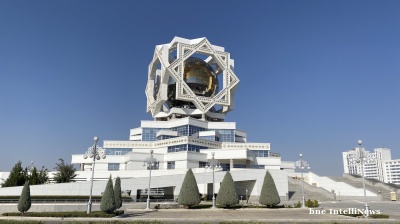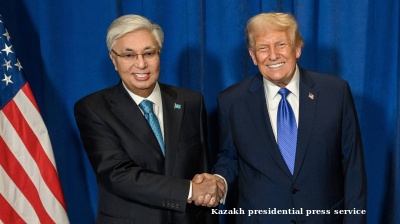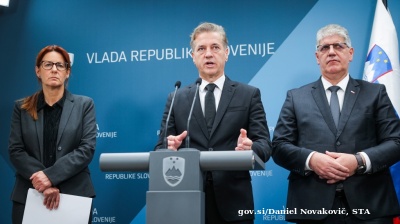The recent mass shootings in Serbia have left the Balkan region in shock and mourning. The two separate incidents resulted in the deaths of 17 people, mostly minors, and injured 20 others.
On May 3, 13-year-old Kosta Kecmanovic killed eight pupils and a security guard at an elite elementary school in Belgrade's Vracar neighbourhood. Six children and a teacher were seriously injured in the shootout.
Late the following day, a 21-year-old man used an automatic weapon to carry out a shooting spree in several villages near the Serbian municipality of Mladenovac, close to Belgrade, killing eight people while 13 were injured.
As Serbia observed its third day of mourning on May 7, citizens from Serbia and neighbouring countries have been paying their respects to the victims, who are now being laid to rest.
Three people were buried in the village of Dubona on May 7, after a day earlier four students and a security worker from the school in Vracar were buried at the Belgrade cemetery. Five young men have been buried in Mali Orasje.
But tragedy has sparked discussions about the importance of mental health support for students, the responsibility of society and parents, and the consequences of arms possession.
Who is to blame?
Some have called the juvenile murderer a monster, while others attribute his mental disarray to societal and parental failures.
When the police asked Kecmanovic why he killed the fellow students, he said: “Because I am a psychopath.”
According to media reports, his father, a prominent radiologist, was teaching his minor son to shoot. The police found as many as five guns in his safe. Kosta Kecmanovic brought two pistols to school when he committed the crime. According to Tanjug, the boy also trained at Airsoft — a military-tactical shooting game that has no age limit— with his father.
Kosta's father, who refused to take any responsibility for his son’s actions, was detained for 30 days. Kosta, being under 14 years of age, cannot be prosecuted under Serbian law, and he was aware of this.
Showing their respects
People in Skopje, the capital of North Macedonia, showed their respect and mourned the victims of the massacres in Belgrade and in Mladenovac by lighting candles and leaving flowers at the Serbian embassy.
In Montenegro, May 7 was also a day of mourning. Flags at public institutions were flown at half-mast, and all TV and radio programming, as well as sports and entertainment events scheduled for the day, has been adjusted to reflect the solemn occasion.
Kosovo’s President Vjosa Osmani sent condolences for the tragedy that happened in Belgrade.
"There is nothing more valuable than the life of a child and nothing more painful than the loss of a life. I send my deepest condolences to all the parents who lost their children in a terrible school attack in Belgrade, and we pray for a speedy recovery for all injured," Osmani wrote on social networks.
Other political leaders in Kosovo also expressed their condolences, while citizens lit candles as a sign of solidarity with the Serbian people, despite the longstanding tensions between the two countries.
Following the tragic school incident in Belgrade, Slovenian NBA star Luka Doncic, who has a Serbian father, announced that he will cover the funeral expenses of the eight children and the security guard who lost their lives in the school shooting, and will provide financial support for grief counselling services for the affected students and staff.
"I am heartbroken by the tragic school shooting in Serbia and the loss of lives, including those of innocent children," he said.
However, the City of Belgrade later thanked the Doncic family for their condolences and desire to cover the funeral costs, but said that the city will bear all the costs and take care of the arrangements for the funerals.
Precautions in Skopje
In response to the tragedy, North Macedonia's government has taken action by implementing security protocols and preparing a manual for schools on preventing peer violence and strengthening psychological and pedagogical services.
The interior ministry in Skopje informed the public that prevention activities are continuously being undertaken and that protocols for security checks are being implemented for the entry and exit of students in and around schools. Such protocols, which were activated after a series of bomb hoaxes, will now be reinforced with additional policing.
The Ministry of Education is preparing a manual for schools on how to deal with the prevention of peer violence and other types of violence. Peer violence can also be reported via email.
On May 7, North Macedonia's Minister of Education Jeton Shaqiri held a meeting with students from a secondary school in the southwestern city of Struga to discuss the prevention of peer violence. During the meeting, Shaqiri emphasised the importance of frequent discussions with young people both at school and within their families.
"Only kindness, mutual respect and tolerant behaviour can contribute to building a peaceful and harmonious school environment in which you young people will devote yourself to learning and compete with knowledge, instead of accepting trends that can lead to disruption of relations and defocusing from the essence of the educational process," Shaqiri said.
In Slovenia, the High School Students' Organisation has called on the authorities to provide a comprehensive list of measures to prevent similar tragedies in Slovenia. They said that while they appreciate the temporary increase in police presence around schools, they believe that this is not a sustainable long-term solution.
Security tightened
Mass shootings are a relatively rare event in Serbia and the region. Before the two shootings in the last week, in the past two decades, five other mass murders have been recorded in Serbia: in Leskovac in 2002 (seven killed), in Negotin in 2007 (nine killed), near Mladenovac in 2013 (13 killed), in Kanjiza, Banat in 2015 (six killed) and in Zitiste, Banat in 2016 (five killed).
Following the two massacres, the authorities have started arresting individuals who glorify murderers, publicly announce their intent to commit crimes and make threats of violence on social media, as well as for illegal possession of weapon.
A minor girl who filmed herself on Tiktok mocking the murders of the eight students and glorifying the 13-year old who committed the crime was taken into custody for an informative interview.
The Serbian police also arrested a 17-year-old from the southern city of Nis who posted a message on his Instagram account threatening that “more than 30 people will be killed tomorrow in Nis”.
Three minors, aged 15 and 16, were also arrested for endangering security and causing panic and disorder.
Activists in Belgrade are circulating a petition calling for the licenses of Pink and Happy TV to be revoked, citing the prevalence of crime, violence and prostitution in their programming as having a negative impact on society.
In the meantime, it was reported that Serbian police officers will be present in all schools in Serbia from 8am until the end of classes as a preventive measure starting from May 8. The ministry plans to hire 1,200 new police officers this year to ensure that each school has an officer present to ensure the safety of students and staff.
The police officers will focus on student safety in school zones, detection of firearms and psychoactive substances. Additionally, the police presence will be increased in all public places where a large number of citizens gather.
Broadcaster RTS quoted professor Mladen Milosevic from the Security Faculty of the University of Belgrade as saying that these measures will help create a sense of security, but that Serbia needs to take many more measures in the long term.
Milosevic stated that putting all blame on the police is not enough to address the issue at hand since everyone shares responsibility for the recent tragedies.
Government officials have already spoken out about the need for tighter gun control. The tragedies have also garnered attention from the international community. The EU ambassador in Podgorica, Oana Cristina Popa, said that arms control is of great importance, and that it is necessary to establish an appropriate legal framework to prevent the misuse of arms.
Features

Washington has a new focus on a Caspian energy play
For most of the last three decades since winning independence, Central Asia has been a bit of a backwater. Not any more. The Trump administration is becoming more focused on Turkmenistan's vast gas reserves and can smell money and power there.

BOTAŞ and Turkey’s hub ambition: from “30-year dream” to cross-border reality
For Ankara, the symbolism is as important as the molecules: Turkey’s energy map is shifting from end-market to hub.

Indian bank deposits to grow steadily in FY26 amid liquidity boost
Deposit growth at Indian banks is projected to remain adequate in FY2025-26, supported by an improved liquidity environment and regulatory measures that are expected to sustain credit expansion of 11–12%





